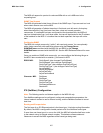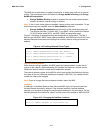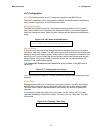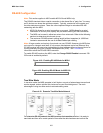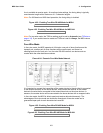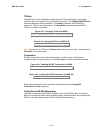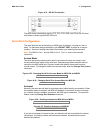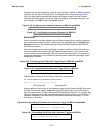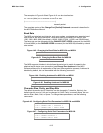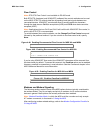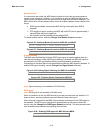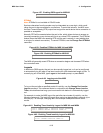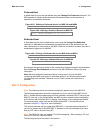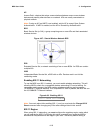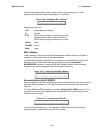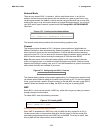
MSS User Guide 4: Configuration
4-13
The examples in Figure 4-40and Figure 4-41 can be visualized as:
x x x xxx xx (data) x x xx xxxxxxxx xx xxx Z xx xxxx
|-------------------------------------------------------|
transmit packet
The complete syntax of the Change Port [Portlist] Datasend command is described in
the MSS Reference Manual.
Baud Rate
The MSS and attached serial device, such as a modem, must agree on a speed or baud
rate to use for the serial connection. Valid baud rates for the MSS-VIA are 300, 600,
1200, 2400, 4800, 9600 (the default), 19200, 38400, 57600, 115200, and 230400 baud.
The baud rate can be changed with the CHANGE PORT SPEED command (for the MSS-
VIA and MSS4) or the CHANGE SPEED command (for the MSS100) followed by a baud
rate number.
Figure 4-42: Changing the Baud Rate for MSS-VIA and MSS4
Local>> CHANGE PORT 1 SPEED 19200
Figure 4-43: Changing the Baud Rate for MSS100
Local>> CHANGE SPEED 19200
The MSS supports Autobaud, which allows the serial port to match its speed to the
attached serial device upon connection (see Change Port Autobaud in the MSS
Reference Manual for an explanation of the baud rate negotiation process). Autobaud is
disabled by default, but can be enabled with the following command.
Figure 4-44: Enabling Autobaud for MSS-VIA and MSS4
Local>> CHANGE PORT 1 AUTOBAUD ENABLED
Figure 4-45: Enabling Autobaud for MSS100
Local>> CHANGE AUTOBAUD ENABLED
Character Size, Parity, and Stop Bits
The default character size of 8 data bits can be changed to 7 data bits. Similarly, the
default stop bit count of 1 bit can be changed to 2 bits. Parity is normally None, but can
also be Even, Mark, Odd, or Space. To change these parameters, use the following
commands:
Figure 4-46: Configuring Serial Port Parameters for MSS-VIA and MSS4
Local>> CHANGE PORT 1 CHARSIZE 7
Local>> CHANGE PORT 1 STOPBITS 2
Local>> CHANGE PORT 1 PARITY EVEN
Figure 4-47: Configuring Serial Port Parameters for MSS100
Local>> CHANGE CHARSIZE 7
Local>> CHANGE STOPBITS 2
Local>> CHANGE PARITY EVEN



